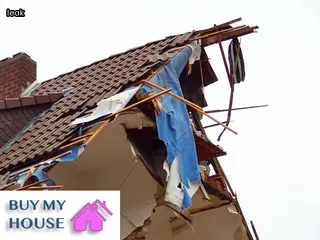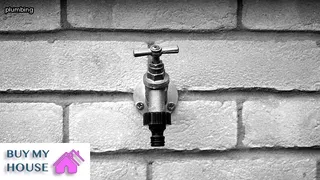Homeowners should be aware of the signs of water damage from a leak in order to quickly detect and resolve a water leak. If you notice any discoloration on walls or ceilings, this could be an indication that there is active water damage from a leak.
Additionally, other warning signs of water damage include peeling paint or wallpaper, mold or mildew growth, and warped flooring or ceiling tiles. If you smell musty odors in your home, this could also be caused by water build-up from a hidden leak.
Homeowners can also inspect the area around toilets, sinks, showers and bathtubs for any moisture buildup or dripping pipes. Finally, another indicator of a potential water leak is high utility bills due to excessive water usage.
By being aware of these signs of water damage from a leak and taking swift action to repair it, homeowners can avoid more costly repairs down the line.

If you have recently discovered a water leak in your home, it is important to take immediate action. First and foremost, turn off the main water valve immediately to reduce any further damage from occurring.
Then, assess the area of the leak and try to identify where exactly the water is coming from. After this initial assessment, it is time to decide whether you should attempt a DIY fix or call a professional plumber.
If you are confident that you can resolve the issue on your own, be sure to shut off all electricity in the area of the leak before beginning repairs and always wear protective gear when dealing with water. If you are unsure of how to proceed or feel that it may be too difficult for yourself, contact a licensed plumber who will be able to quickly and effectively solve your problem.
Taking immediate action when you encounter a water leak in your home is key to ensuring minimal damage and cost.
It is important to assess the damage following a water leak in your home as soon as possible. If left unchecked, the resulting damage can be costly and time-consuming to repair.
It is also important to understand how to quickly resolve a water leak, including identifying the source of the leak and taking steps to stop it. Knowing where to look for signs of water damage can help you determine what repairs may be necessary.
Common areas include walls, ceilings, floors, and furniture that may have been exposed to moisture or standing water. Inspecting appliances such as dishwashers, washing machines, and water heaters can also help you identify potential issues that could have caused a leak.
Once the source has been identified and stopped, it is important to take further steps such as cleaning any affected surfaces and drying them thoroughly to prevent further damage from occurring. Additionally, checking for mold growth is essential if there was a significant amount of moisture in your home following a leak.
Taking these steps will help ensure your home remains safe and secure in the wake of a water leak.

Having a water leak in your home can be a stressful and overwhelming experience. Knowing how to quickly react and resolve the issue is essential for minimizing any damage to your property.
The first step when dealing with a water leak is to locate the source of the leak. If you cannot find the source, it is important to turn off the main water supply so that you can minimize further damage.
After turning off the main water supply, you should assess the extent of the damage and begin drying out any wet areas with towels or other absorbent material. To repair a minor leak, you may be able to use plumber's tape or epoxy putty, but if the problem is more serious, it is best to contact a professional plumber who will be able to properly inspect and repair any potential issues.
Additionally, having your plumbing system regularly inspected will help ensure that any potential problems are identified before they cause major damage. If you act quickly and take proactive measures when dealing with an emergency water leak in your home, then it will help guarantee that any potential damages are kept at a minimum.
It is important to take immediate action when you discover a water leak in your home, as it can cause significant damage if left unchecked. Luckily, there are simple steps you can take to quickly identify the source of the leak and prevent further destruction to your property.
Start by turning off the main water supply to your house so that no additional water is entering your home. Then, identify where the leak is coming from - this may include inspecting visible piping and checking for damp patches or puddles in areas like the kitchen, bathroom, or basement.
Once you've located the source of the problem, it's time to repair it. If needed, call a professional plumber who can provide expert advice on how to best fix the issue.
Taking swift action will protect your home from further water damage and help preserve its structural integrity.

Inspecting for hidden water leaks in your home can be an important step to take when attempting to quickly resolve a water leak. It's essential to familiarize yourself with the potential causes of a water leak and then assess where they may be found in your home.
If the leak is coming from an external source, you should look around the perimeter of your home for any signs of moisture or ponding on the ground that may indicate a broken pipe or other issue. If it's an internal leak, check all visible pipes and fixtures for any signs of corrosion or leaking.
You should also check around areas such as sinks, toilets, showers, and tubs for any wet spots or discolored walls that could indicate an underlying issue. Additionally, if you own a basement, crawlspace, or attic, inspect these spaces for any signs of mold growth which could point towards a hidden water leak issue.
Making sure to thoroughly inspect all areas of your home can help you quickly identify and resolve any water leakage issues before they become more serious.
When a water leak occurs in a home, it can quickly become a major problem if proper measures are not taken to contain it. The first step is to locate the source of the leak and then take steps to shut off the main water valve for your home or turn off the individual valves that control water flow to the affected area.
Once the water supply has been cut off, assess the damage and decide on an appropriate course of action. If possible, use towels and rags to absorb as much spilled water as you can.
It is important to dry out any wet areas completely, as moisture left behind can lead to mold growth. If necessary, you may need to call in a professional plumber who can patch up any damaged pipes or replace them altogether.
Taking these immediate steps will help ensure that your leak is contained and prevent further damage from occurring within your home.

Checking your water meter is the first step you should take to quickly and accurately determine if you have a water leak in your home. If the water level in the meter is higher than when it was last checked, then you may be dealing with a leak.
To confirm that there is a problem, shut off all sinks, toilets, showers, and other water-using appliances in your home for at least two hours. After that time has passed, check the meter again - if the reading has gone up, then there's probably a leak somewhere in your plumbing system.
Make sure to take note of any unusual sounds or odors coming from your pipes as well; this could indicate an issue with them that needs to be addressed. If you suspect a serious issue such as a broken pipe or sewage backup, don't hesitate to call a professional plumber right away.
A qualified technician will be able to identify where the leak originated and provide expert advice on how best to deal with it - saving you time and money in the long run.
It is important to quickly identify the source of a water leak in your home to prevent further damage. Start by turning off the water supply and then inspect visible areas for signs of water such as damp walls or floors, discoloration or mold.
If you don’t find any evidence of a leak, move on to other potential sources like pipes, toilets and faucets. Check each one for signs of wear and tear or corrosion which could be causing the leak.
You should also check the shower head, bathtub faucet and sink taps to make sure they are not leaking. If you are unable to locate the source yourself, contact a professional plumber who can use their expertise to find the problem and provide an effective solution.
Remember that even a seemingly small leak can cause significant damage if left unchecked, so it is important to act quickly.

There are many options available to quickly and efficiently resolve water leaks in the home. One of the first steps is to identify the source of the leak – this could be a crack, worn out seal or joint, a corroded pipe, or something else.
Depending on the cause of the leak and its location, there are various solutions that can be employed. A temporary fix for minor water leaks may include patching up cracks with epoxy or applying silicone caulk around seals and joints.
For larger or more serious issues it may be necessary to replace pipes or other components. In some cases a professional plumber may need to be consulted for expert advice and assistance with resolving water leaks.
Other solutions such as installing pressure relief valves or using copper piping instead of plastic can also help prevent future water leaks from occurring in your home. Taking proactive measures such as regularly inspecting all plumbing fixtures and checking for signs of leakage is an important part of ensuring your home remains free from water damage caused by leaks.
When dealing with a water leak in your home, it is important to have knowledge about the types of pipes and roofs that you may be dealing with. Common types of pipes used in plumbing include copper, galvanized steel, PVC, and PEX. Copper pipes are more durable and resistant to corrosion but are expensive.
Galvanized steel pipes are prone to rusting over time and need frequent replacement or maintenance. PVC pipes are lightweight and inexpensive but not as durable as other materials. PEX pipe is a flexible alternative that can be installed quickly without soldering or glue.
When it comes to roofing materials, common options include asphalt shingle, wood shake, slate tile, metal panels, clay tiles, rubber membrane, and green roofs. Asphalt shingles provide protection from the elements at an affordable price while wood shake has a unique look and can last for decades if properly maintained. Slate tile is heavy and expensive but lasts a long time due to its durability.
Metal panels offer energy efficiency but require careful installation for proper performance. Clay tiles look great but require regular maintenance to prevent cracking due to temperature changes. Rubber membranes are waterproof but susceptible to damage from UV rays and hail storms.
Green roofs can help reduce energy costs by providing insulation and adding curb appeal. Knowing about different types of pipes and roofs will help you quickly resolve any water leaks in your home efficiently and effectively.
Water leaks in your home can be extremely serious, causing major damage to your property if not addressed quickly. Water can saturate and damage flooring, drywall, insulation, and furniture.
It can also cause mold growth that could lead to health issues for you and your family. A water leak can also cause a significant increase in your water bill if left unchecked.
The good news is that most water leaks are relatively easy to identify and repair. If you suspect a leak in your home, look for signs such as wet or discolored spots on walls or floors, increased humidity levels, a decrease in water pressure from fixtures, or an unexplained jump in your water bill.
If you find evidence of a leak, it is important to act quickly and have the source identified and repaired by a professional plumber. Taking preventative measures such as regularly inspecting faucets and pipes for signs of wear or corrosion can help save you time, money, and stress by preventing further damage from occurring due to an undetected water leak.

If you have a water leak in your home, it is important to find out where it is coming from as soon as possible. To quickly resolve the issue, there are several steps you should take.
First, turn off your main water supply to prevent any further damage. Next, locate the source of the leak by performing a visual inspection; look for signs like wet spots on walls or floors, discoloration on walls or ceilings, and/or puddles around fixtures like sinks or toilets.
If you can’t determine the source of the leak visually, you may need to call a plumber for help. A plumber will be able to use specialized tools to detect a water leak and help you repair it.
Additionally, they can provide advice on how to avoid future water leaks in your home. By following these steps, you can quickly find and fix a water leak in your home.
Yes, you can fix a water leak yourself! Depending on the severity of the leak, there are certain steps you can take to quickly resolve the issue. First, it is important to identify where the water leak is coming from.
If the source is a pipe or faucet, inspect it for any visible damage such as cracks or holes. If this is present, replace the pipe or faucet with a new one.
Another cause could be a loose connection between two pipes. In this case, tighten up connections using pliers and pipe wrenches.
If these initial attempts don’t work, consider calling an experienced plumber who will be able to diagnose and resolve more complex issues. With the right tools and know-how, you can easily and quickly repair a water leak in your home!.
When a water leak occurs in your home, it can be an emergency situation. The cause of the issue must be identified before any repairs can begin.
If the leak is left unchecked, it could lead to extensive damage and costly repair bills that could have been avoided. Knowing how to quickly resolve a water leak is essential for ensuring the safety of both you and your property.
By taking the time to assess the situation and act accordingly, you can help to stop further damage from occurring and address the problem in a timely manner. Taking action as soon as possible also helps to minimize any disruption or inconvenience that may come with repairing a water leak.
With proper planning and preparation, you can learn how to quickly resolve a water leak in your home and prevent potential accidents or disasters from happening.